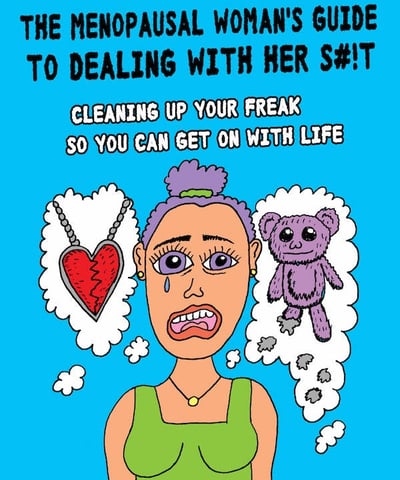Menopause and Personality Disorders: Is There a Connection?
Menopausal symptoms can feel so overwhelming it may feel like you're losing your mind, for good. But can menopause cause personality disorder? Get the facts.
MENOPAUSAL SYMPTOMSMENOPAUSAL MENTAL HEALTH
Kennerly Clay
5/16/20245 min read


Can menopause cause personality disorder?
Personality disorders are often misunderstood, sometimes dismissed as mere quirks or dramatic mood swings. However, these mental health conditions are far more intricate and impactful than popular misconceptions suggest.
Many women experience emotional shifts, mood swings, or heightened anxiety during menopause, which can sometimes be mistaken for more severe mental health conditions. Understanding the link between Menopause and Mental Health is crucial, as it aids in coping with menopause depression and other emotional challenges, helping women seek the right support and treatment.
According to the Diagnostic and Statistical Manual of Mental Disorders (DSM-5), a personality disorder is characterized by enduring patterns of behavior, cognition, and inner experience that significantly deviate from the cultural norms of the individual.
Picture this: Everyone has their unique way of interacting with the world, but for someone with a personality disorder, these patterns are not just unique—they are rigid and pervasive, affecting nearly all aspects of their life.
Contrary to popular belief, personality disorders are not the same as having a quirky personality or experiencing occasional mood swings. These conditions are severe and persistent, often leading to distress and impairment in social, occupational, or other important areas of functioning. They're not just phases or personality traits; they are diagnosable mental health conditions that require appropriate treatment and management.
The DSM-5 outlines several types of personality disorders, each with its own distinctive features. For instance, borderline personality disorder (BPD) is characterized by intense emotional instability and fear of abandonment. Narcissistic personality disorder (NPD) involves a pervasive pattern of grandiosity and a need for admiration, while antisocial personality disorder (ASPD) is marked by a disregard for the rights of others and a lack of empathy. These are just a few examples, illustrating the diverse and complex nature of personality disorders.
Understanding the seriousness of personality disorders helps in debunking the myths that surround them. Again, they're not mere phases or eccentricities but profound psychological conditions that affect the lives of those who experience them. Proper diagnosis and intervention are crucial for improving the quality of life for anyone living with these disorders.
If you or someone you know is in crisis, please call 988, the Suicide & Crisis Lifeline in the United States.
Menopause and changes in personality
Welcome to the shitstorm of menopause. This life stage, marked by the cessation of menstrual periods, brings about significant hormonal changes, notably a decrease in estrogen and progesterone levels. The North American Menopause Society explains that these hormonal shifts can result in a variety of physical and psychological symptoms. Menopause and mental health often clash in a clusterfuck of "feeling crazy."
As estrogen and progesterone levels plummet, the body reacts in ways that can catch many women off guard. Hot flashes, for instance, can strike at the most inconvenient times, leaving you soaked with sweat, fanning yourself like mad, and trying to remove yourself from other human beings. Mood swings in menopause are another common symptom, transforming a calm day into an emotional storm in mere minutes. Sleep disturbances come in for the after-party, making it hard to get a good night's rest, which only amplifies the irritability and fatigue.
While these symptoms might feel overwhelming, it's important to recognize that they're a natural part of the hormonal adjustment process. Think of it as your body's way of recalibrating. Research indicates that these changes are generally temporary, and while they can affect mood and emotional stability, they do not equate to a personality disorder. So, if you find yourself feeling like you're on a never-ending hell ride, remember that the ride will eventually come to a stop.
While menopause can indeed cause significant shifts in mood and behavior due to the hormonal upheaval, these changes are usually transient. Understanding the science behind these symptoms can help in coping with them and provide reassurance that what you're experiencing is a common part of this life stage.
While menopause brings about significant hormonal changes, it doesn't have the power to fundamentally alter your personality to the extent of causing a disorder.
Can mood changes in menopause cause personality disorder?
Let's cut to the chase: Menopause itself does not cause personality disorders. Before you start blaming hot flashes for every quirky behavior, let's remember menopause is a natural biological process that marks the end of your reproductive years. While it brings about significant hormonal changes, it doesn't have the power to fundamentally alter your personality to the extent of causing a disorder.
So, why do some people believe that menopause can lead to personality disorders?
It's all about the symptoms and stressors that come with this life stage. The hormonal fluctuations during menopause can exacerbate pre-existing mental health conditions like anxiety and depression. Imagine having a pre-existing mood disorder and then adding hot flashes, insomnia, and night sweats to the mix—it's a recipe for emotional disaster. However, this is not the same as developing a new, full-blown personality disorder.
Studies have shown that while menopausal symptoms can temporarily affect behavior and mood, they don't cause long-term personality changes - no matter how cray-cray you're feeling! For instance, studies have found that women experiencing menopausal symptoms reported higher levels of stress and mood disturbances, but these are temporary and manageable with proper care.
Expert opinions echo this sentiment. Dr. Hadine Joffe, an expert in women's mental health at Mass General Brigham, suggests that while hormonal changes can lead to mood swings and irritability, these are different from the persistent and pervasive patterns of behavior seen in personality disorders.
So, what's the takeaway here? If you're navigating the sometimes rocky waters of menopause, don't panic. Understand that while you might feel your personality is changing, any changes in behavior are likely associated with menopause symptoms that are new for you. In some ways, since you've never been at this particular juncture before, your personality in response to what you're dealing with may in fact be different - but not disordered.
Practical advice? Prioritize self-care (like seriously, put yourself fucking first). Seek professional help if you're struggling with severe symptoms, and remember that this too shall pass. Menopause might make you feel a bit "off," but it's not rewriting your personality.
Wanna talk more about personality changes in menopause?
Books for women who are losing it in menopause
Mental Health
Losing your mind in peri/menopause?
The menopausal woman's guide series
Financial Health
Had enough of financial insanity?
Personal Growth
Triggers? Old stuff kicking up?
Related topics
Explore helpful articles, tips, and advice for women who are losing their shit in menopause.
Community
Stay Connected
© 2024. Eclectic Content, Inc. All rights reserved.






